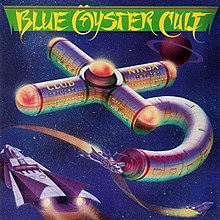Provenance: No big story behind this one, I'm afraid. The story is that this is the sixth-biggest selling album ever, and it's by AC/DC.
Review: This one should be easy, no? It's baby's first hard rock record. It's part of the headbanger's canon. No self-respecting air-guitarist would go without.
However, I have been a bit of a contrarian in the past, making sport of sacred cows such as Deep Purple and Kiss. At least I haven't doled out any shoeings as a pose; my opinions may seem wrongheaded to you, fair reader, but they're forged in white heat of honesty. So with that being said, what do I find amiss with Back In Black?
Er, nothing much. It's pretty fantastic.
As a fan, I hold the uncontroversial opinion that Bon Scott was the greater frontman whilst maintaining that Back In Black is the best overall AC/DC album. This, despite the fact that, with the advent of Brian Johnson, its shorn of many of the aspects Scott brought to the band that made them so indelibly AC/DCish - the boozy bonhomie, leery (albeit often self-deprecating) innuendo and a bucketload of sleaze. Johnson is a different beast altogether, a man who sounds on the brink of imploding every time he opens his mouth, as strained and intense as Scott was relaxed and cheery. Upon listening today, it struck me as it never has before that Johnson actually sounds a fair bit like Dan McCafferty of Nazareth, another fella who sounded like he was dying every time he sang.
So what makes Back In Black so good? Some obvious points - catchy, precision-tooled riffs in every song; a big, roomy production coupled with unfussy music; the eye-popping weirdness of Brian Johnson; and the fact that, amidst the heavy blooz 'n' bluster, there can be detected the occasional stab at grandeur. There's a quality approaching stateliness in 'Hell's Bells' and 'Rock 'N' Roll Ain't Noise Pollution', a quality that even the tautology of the latter's chorus line cannot diminish. Back In Black was the first AC/DC album after Scott's passing, and the tolling of the bell that signifies the start of the album pulses with a rare power, no matter how many times you care to listen.
I should also observe that some of the plus points I've briefly sketched out would prove the seeds of AC/DC's downfall as a creative force, even as they became the stadium behemoth they are today. As with Def Leppard's Hysteria, also produced by Mutt Lange, Back In Black is shorn of any twisty intricacy - not that AC/DC would ever be confused with Bach, but this is definitely them at their most stripped-back. It works here, bold riffs against a stark canvas, but on later albums where the ideas weren't quite up to snuff, it began to sound boring.
Likewise, where Brian Johnson sounds quite demented here, there's little variation from album to album. Again, the effect wore off, and whilst a better singer in technical terms than Bon Scott, he doesn't possess Scott's ability with mood, colour and shading. Feel free to disagree with me on this, but I've listened to a whole lotta DC, and these are the conclusions I've reached. Also, whilst commendably keeping the spirit of sleaziness alive, 'Let Me Put My Love Into You' and 'Givin' the Dog a Bone' barely reach the qualifying bar for single-entendre. Still, very good rock songs both!
Listen to me, harping on about all the things AC/DC did subsequent to Back In Black. Suffice it to say, I can't add much to the fund of knowledge about the album - it's there, it's brilliant, and right now around the world fumbled attempts at 'Back In Black' emanate from one thousand guitar shops. I suppose it's remarkable in the sense that it's both an elegy and a celebration, yet never comes across as either mawkish or, at the other end of the spectrum, inconsiderate. How do you mourn the death of your revered frontman? By making one of the greatest rock and roll records of the era.






